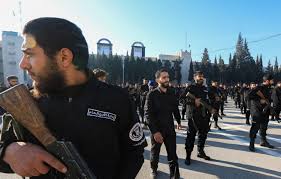More than 1,800 Syrian security personnel are currently undergoing intensive training in Qatar and Saudi Arabia as part of a sweeping regional initiative to restructure and professionalise Syria’s internal security forces, Al-Hal Net has learned from exclusive sources.
The coordinated training efforts reflect a growing regional investment in stabilising Syria’s fragile transitional government. However, international officials warn that time is running out to prevent institutional collapse and renewed civil strife.
Qatar and Saudi Arabia Take the Lead
According to the source, over 1,000 officers and personnel from Syria’s General Security Directorate are enrolled in a specialised training programme in Qatar. A parallel session involving more than 800 Syrian police trainees is being held in Saudi Arabia. Each programme spans 45 days, with the option of extension.
The Qatari programme is supervised by senior officers from Qatar’s Internal Security Force “Lekhwiya,” including Colonel Saleh Abdulwahab al-Muhannadi, commander of the Support and Reinforcement Group. Coordination is being handled by Colonel Falah Abdullah al-Dosari, Director of International Cooperation at Qatar’s Ministry of Interior.
In Saudi Arabia, similar oversight is being provided for police-focused training modules.
These programmes are part of a broader plan to rebuild and reform Syria’s internal security sector, replacing remnants of the Assad-era apparatus with a professional force capable of operating under civilian oversight.
Funding and Political Significance
In a further sign of Qatari commitment, Doha has pledged $87 million in financial assistance to Syria’s transitional government. The grant, distributed over three months at $29 million per month, is earmarked for public sector salaries in education, healthcare, and social services, including pensions for non-military retirees.
Qatar is also providing a $30 monthly bonus to each government employee in Syria, signalling a direct economic lifeline for civil servants.
The Syrian Ministry of Interior’s Public Relations Department is coordinating with Qatari and Saudi authorities to oversee implementation and logistics of the training operations.
Despite Gulf support, U.S. policymakers remain divided on how far to go in backing Syria’s transitional leadership. Speaking before the Senate Foreign Relations Committee on Tuesday, Secretary of State Marco Rubio acknowledged the fragile state of the Syrian administration.
“If we engage with them, there’s a chance they might succeed in stabilising Syria. But if we don’t, they certainly won’t,” Rubio said. “Given the challenges they face, they are weeks—not months—away from potential collapse and renewed civil war, possibly leading to a partition of the country.”
His remarks underscore the high stakes involved, with international actors weighing whether limited support can avert a return to chaos.
Toward a New Security Architecture
Analysts say the security training in Qatar and Saudi Arabia reflects a shift in regional priorities: investing in state-building rather than militia patronage, and ensuring Syria’s new institutions reflect regional standards of governance and accountability.
While observers applaud the efforts, they note that long-term success will depend on more than foreign aid or training. The creation of a cohesive, trusted, and nationally accountable security force requires deep structural reform—something Syria’s new leaders have yet to fully institutionalise.
Still, the presence of nearly 2,000 officers in professional training abroad marks a visible step toward a future where Syria’s security might be grounded not in repression, but in competence, legality, and regional integration.
This article was translated and edited by The Syrian Observer. The Syrian Observer has not verified the content of this story. Responsibility for the information and views set out in this article lies entirely with the author.


